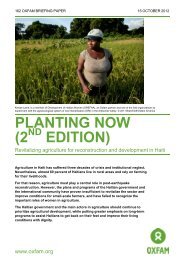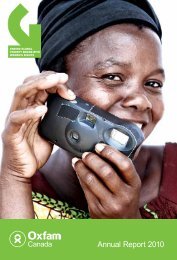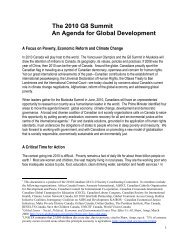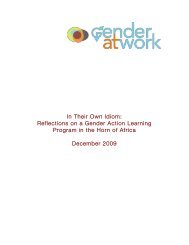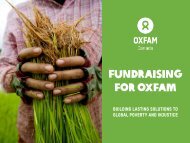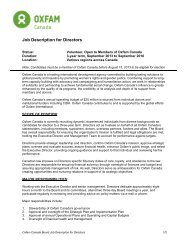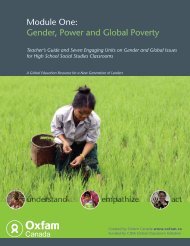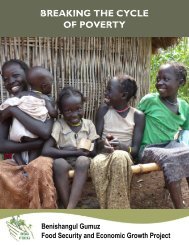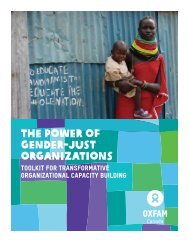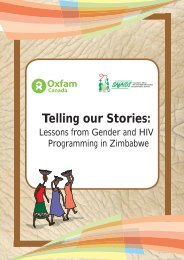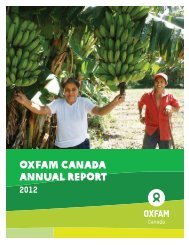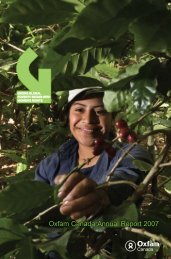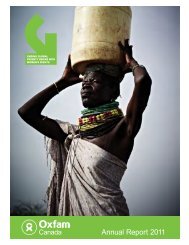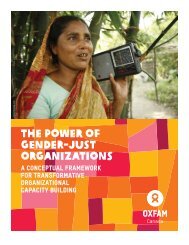The New Forests Company and its Uganda ... - Oxfam Canada
The New Forests Company and its Uganda ... - Oxfam Canada
The New Forests Company and its Uganda ... - Oxfam Canada
Create successful ePaper yourself
Turn your PDF publications into a flip-book with our unique Google optimized e-Paper software.
2008, the District Chair of Kiboga called, in a letter to the Prime Minister, for a halt to the<br />
‘brutal <strong>and</strong> forceful evictions’ arguing, ‘whereas the above forests were gazetted long ago<br />
no effort was made by the governments of those days from preventing people from<br />
encroaching upon them, as a result people began settling in these reserves as early as<br />
1971, we have to agree that this period is long enough to allow some to make a number<br />
of developments on this l<strong>and</strong>.’ 84<br />
It also appears that the authorities failed to assist evictees with compensation or<br />
alternative l<strong>and</strong>. Some in government believed the state had an obligation to<br />
compensate those it evicted; for example, a letter from the Office of the Prime Minister<br />
about the Kiboga evictions to the Minister of General Duties states, ‘Unfortunately up to<br />
now neither resettlement nor compensation has been made. <strong>The</strong> Prime Minister has<br />
directed me to request you to convene an inter-Ministerial meeting involving the Minister<br />
<strong>and</strong> Minister of State for L<strong>and</strong>s <strong>and</strong> Urban Development with their Permanent<br />
Secretaries to resolve the matter within one month.’ 85 However, none of the evictees<br />
interviewed by <strong>Oxfam</strong> had received compensation or resettlement. <strong>The</strong> International<br />
Covenant on Economic <strong>and</strong> Social Rights, to which the Ug<strong>and</strong>an government is a<br />
signatory, prohib<strong>its</strong> government actions that result in degradation of citizens’<br />
livelihoods. 86 NFC argues that the government prevented it from offering compensation<br />
to evictees. 87<br />
National governments have a duty to protect their citizens’ rights. However, under the<br />
international st<strong>and</strong>ards to which it says it adheres, NFC also has clear obligations to<br />
consult <strong>and</strong> negotiate with affected communities <strong>and</strong> to ensure those who are evicted as<br />
a result of <strong>its</strong> operations are not materially worse off than before through compensation<br />
for lost assets, provision of alternative l<strong>and</strong>, <strong>and</strong> restoration of livelihoods. NFC says,<br />
‘Our main challenge remains encroachment on National Forest Reserves – this has<br />
inhibited our planting programmes in the past <strong>and</strong> prevents us seeking out more CFRs<br />
on which to plant.’ 88 <strong>The</strong> Acting Director of the NFA told <strong>Oxfam</strong>, ‘We need to make sure<br />
investor l<strong>and</strong> is secure.’ 89 NFC states that it is subject to the safeguards of the IFC – an<br />
indirect investor in NFC. <strong>The</strong> IFC is clear that if government-managed resettlement <strong>and</strong><br />
compensation of affected communities does not live up to <strong>its</strong> st<strong>and</strong>ards, then the<br />
company must collaborate with the government to ‘achieve outcomes that are consistent<br />
with the Performance St<strong>and</strong>ard.’ 90 Similarly, the FSC, whose st<strong>and</strong>ards NFC comm<strong>its</strong> to<br />
uphold in <strong>its</strong> Environmental Policy, states, ‘Special attention will be paid to social issues<br />
of l<strong>and</strong> acquisition for plantations, especially the protection of local rights of ownership,<br />
use, or access.’ 91 NFC has pointed to <strong>its</strong> community development programmes, stating<br />
that ‘former encroachers who were from Mubende or Kiboga originally, settle outside the<br />
boundaries of the reserve <strong>and</strong> thus benefit from both plantation jobs which are<br />
advertised in surrounding communities <strong>and</strong> the various educational, health, <strong>and</strong><br />
livelihood enhancing projects implemented by NFC, communities, <strong>and</strong> local<br />
government’. 92 However, it acknowledges that it is unable to confirm whether the<br />
affected communities have access to these projects, since it ‘has been difficult to follow<br />
the former encroachers once they vacate the reserve’ 93 <strong>and</strong> that it did not have the<br />
resources to do so. 94 An assessment of NFC’s Mubende plantation by the IFC found<br />
that the company had discharged <strong>its</strong> obligations by acting ‘in accordance with laws<br />
prohibiting their direct compensation of encroachers while still applying pressure on<br />
District <strong>and</strong> National government.’<br />
O<br />
xfam believes that the affected communities in Kiboga <strong>and</strong> Mubende deserve to<br />
have their case heard <strong>and</strong> to see justice done.<br />
<strong>Oxfam</strong> defines ‘l<strong>and</strong> grabs’ as l<strong>and</strong> acquisitions that violate human rights <strong>and</strong> do not allow<br />
for the free, prior, <strong>and</strong> informed consent of the affected l<strong>and</strong> users. In the case of NFC, it<br />
does not matter that the company has not bought or leased the l<strong>and</strong>, but merely licensed<br />
it from the government: the effective result is that it has influence over what happens on<br />
that l<strong>and</strong> for 50 years. <strong>The</strong> company <strong>and</strong> government argue that those who lived on the<br />
l<strong>and</strong> were there ‘illegally’; however, under any st<strong>and</strong>ards of good practice – be they those<br />
of the FSC, the World Bank, or private investor policies, such as those of HSBC – forced<br />
10<br />
<strong>The</strong> <strong>New</strong> <strong>Forests</strong> <strong>Company</strong> <strong>and</strong> <strong>its</strong> Ug<strong>and</strong>a plantations<br />
<strong>Oxfam</strong> Case Study, September 2011



